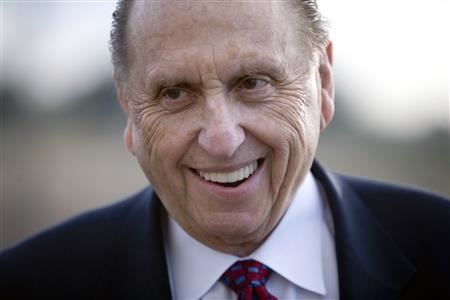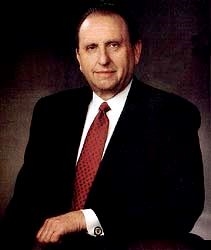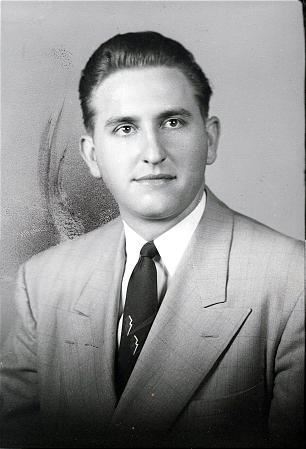 |
| (http://pt.wikipedia.org/wiki/Thomas_S._Monson#mediaviewer/File:Thomas_S_Monson.jpg) |
"We tend to become like those whom we admire" (Thomas S. Monson). Thomas S. Monson has willingly loved and served others throughout his whole life. His life was also one where he showed true bravery. Thomas Spencer Monson, the current President of the Church of Jesus Christ of Latter Day Saints, was born August 21, 1927. He married Frances Johnson on October 7, 1948, in the Salt Lake City Temple. He was called to be a "Bishop" (a "Bishop" is the leader of a single congregation of parishioners) at age 22. At age 27, he became a member of the "Stake Presidency" (a "Stake" is a collection of several congregations), and asked to help look after all the people in his geographic region. At 31, he was called to be a Mission President in the Canadian Mission. (A "Mission President" is in charge of watching over the young Mormon missionaries sent to a particular area). He was sustained in the Quorum of the Twelve Apostles (the second highest governing body of the Church of Jesus Christ of Latter Day Saints) at age 36. For him to hold these positions in the Mormon Church at those young ages was and continues to be rare and amazing. Finally, on February 3, 2008, Thomas S. Monson was sustained as the President of the Church of Jesus Christ of Latter Day Saints. He will hold this position until he dies. Thomas S. Monson is a hero because he is brave and charitable.
 |
| (https://www.lds.org/ensign/1995/07/president-thoma ()) |
Thomas S. Monson also found ways to help others throughout his entire life. As noted above, Thomas S. Monson was a Bishop of his home congregation at the age 21. His congregation consisted of 1,080 members, 84 of which were widows. A Bishop of a congregations is responsible for the temporal and spiritual welfare of all members of the congregation. Thomas S. Monson took a gift and visited every one of those widows every Christmas for as long as each widow lived; well after he was no longer their Bishop. He was present at some of those widows' final moments. Family members of those widows told of how much they could tell he loved those widows, and how much those widows loved him. He spoke at every one of their funerals (Holland). Even at a young age, Thomas S. Monson always wanted the best for others. When he realized that others were in need, he didn't wait to be asked to help. He did not visit the widows because he thought it would make him famous; he did it because he loved them, and loved to help them. Another example of his charitable nature was when he visited East Germany during the Cold War. During the trip to East Germany, he gave away his spare suits and shirts to men who didn't have church clothes. He even gave away the shoes from his very own feet (Holland). Thomas S. Monson didn't have to give away his belongings, but he saw that some people were worse off than him, and he wanted to help them. He loved the people, and didn't think that helping others was a burden. Thomas S Monson has loved the people he has served and shown how to be charitable to others.
 |
| (http://www.deseretnews.com/article/695250152/President-Monson-recalls-influence-of-family-on-his-lif) |
Thomas S. Monson is brave when unexpected storms come throughout his life. While in his youth, Monson served in the United States Army. He was not only brave in his service for his country, but he also had to exhibit another kind of bravery: being willing to stand up for yourself when no one else is standing with you. He speaks of one experience that he had in a talk he gave called: "Dare to Stand Alone." He states: "I shall ever remember when Sunday rolled around after the first week [of basic training]. We received welcome news from the chief petty officer. Standing at attention on the drill ground in a brisk California breeze, we heard his command: "Today everybody goes to church - everybody, that is, except for me. I am going to relax!" Then he shouted, "All of you Catholics, you meet in Camp Decatur - and don't come back until three o'clock. Forward, march!" A rather sizeable contingent moved out. Then he barked out his next command: "Those of you who are Jewish, you meet in Camp Henry - and don't come back until three o'clock. Forward, march!" A somewhat smaller contingent marched out. Then he said, "The rest of you Protestants, you meet in the theaters at Camp Farragut-and don't come back until three o'clock. Forward, march! "Instantly there flashed through my mind the thought, "Monson, you are not a Catholic; you are not a Jew; you are not a Protestant. You are a Mormon, so you just stand here!" I can assure you that I felt completely alone. Courageous and determined, yes - but alone" (Monson). This experience shows that he was brave. Monson could have marched off with others of another faith so that he wouldn't feel embarrassed, but he stood up for his beliefs and stood alone. He wasn't afraid to stand for what he thought was right even if it meant that he may be mocked or made fun of. Another example of Monson having courage is when he was serving as a young Bishop. He states: "The general session of our stake conference (a special meeting where the members of several congregations come together for a Sunday meeting) was being held in the [main assembly hall on Temple Square in Salt Lake City]. Our stake presidency was to be reorganized. The Aaronic Priesthood (young men between the ages of 12 and 18), including members of bishoprics, was providing the music for the conference. As we concluded singing our first selection, President Joseph Fielding Smith (the current President of the Church), our conference visitor, stepped to the pulpit and read for sustaining approval the names of the new stake presidency. I am confident that the other members of the stake presidency had been made aware of their [assignments], but I had not. After reading my name, President Smith announced: "If Brother Monson is willing to respond to this [assignment], we shall be pleased to hear from him now." As I stood at the pulpit and gazed out on that sea of faces, I remembered the song we had just sung. Its title was "Have Courage, My Boy, to Say No." That day I selected as my acceptance theme, "Have Courage, My Boy, to Say Yes" (Monson ). This is another example of where Thomas S. Monson showed bravery. Thomas S. Monson was willing to take on such a daunting assignment at such a young age, even though it hadn't even been discussed with him before. He knew that being a member of a Stake Presidency was a lot of volunteer work, but he believed in himself and knew that he could accomplish what was being asked of him. Thomas S. Monson has shown that when he is asked to stand alone, or to do something that he isn't sure he could do, he is ready to bravely face all those challenges.
Thomas S Monson has been charitable to others while having a brave heart. He serves others willingly. He helps others in time of need. He goes out of his way to be kind even though it may have been a burden to him, and he has demonstrated bravery. Monson has stood up for his beliefs, even though he may have stood alone at the time. His bravery extended to taking on all the challenges which came his way. He looks for ways to help people. He is kind to everyone he meets. He never judged others. I would like to be like that. I would like to be brave like him, and stand up for what I believe in, even though it may be unpopular. I would like to learn to love to serve others, and help others who are in need. I would like to be brave enough to take on new challenges, and to do them with a glad heart. Thomas S Monson has inspired me, and countless others, to be a better person and to live a better life.
"Thomas S. Monson." BrainyQuote. Xplore, n.d. Web. 12 Feb. 2015.
Page created on 2/14/2015 12:00:00 AM
Last edited 2/14/2015 12:00:00 AM
